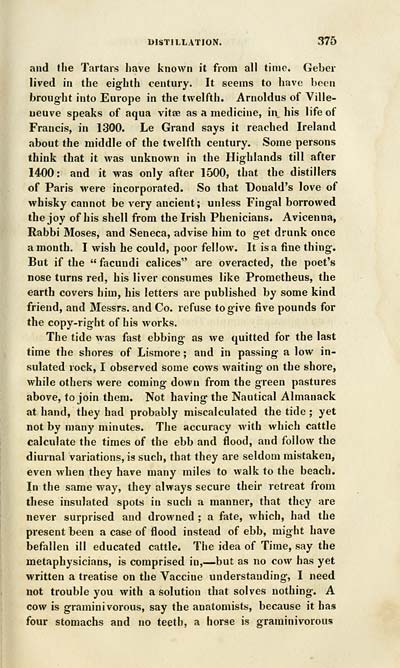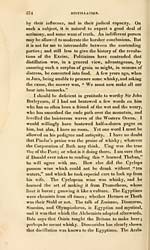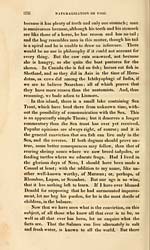Download files
Complete book:
Individual page:
Thumbnail gallery: Grid view | List view

DISTILLATION. 375
and the Tartars have known it from all time. Geber
lived in the eighth century. It seems to have been
brought into Europe in the twelfth. Arnoldus of Ville-
ueuve speaks of aqua vitae as a medicine, in his life of
Francis, in 1300. Le Grand says it reached Ireland
about the middle of the twelfth century. Some persons
think that it was unknown in the Highlands till after
1400: and it was only after 1500, that the distillers
of Paris were incorporated. So that Donald's love of
whisky cannot be very ancient; unless Fingal borrowed
the joy of his shell from the Irish Phenicians. Avicenna,
Rabbi Moses, and Seneca, advise him to get drunk once
a month. I wish he could, poor fellow. It is a fine thing.
But if the " facundi calicos" are overacted, the poet's
nose turns red, his liver consumes like Prometheus, the
earth covers him, his letters are published by some kind
friend, and Messrs. and Co. refuse to give five pounds for
the copy-right of his works.
The tide was fast ebbing- as we quitted for the last
time the shores of Lismore ; and in passing a low in-
sulated rock, I observed some cows waiting on the shore,
while others were coming down from the green pastures
above, to join them. Not having the Nautical Almanack
at hand, they had probably miscalculated the tide ; yet
not by many minutes. The accuracy with which cattle
calculate the times of the ebb and flood, and follow the
diurnal variations, is such, that they are seldom mistaken,
even when they have many miles to walk to the beach.
In the same way, they always secure their retreat from
these insulated spots in such a manner, that they are
never surprised and drowned ; a fate, which, had the
present been a case of flood instead of ebb, might have
befallen ill educated cattle. The idea of Time, say the
metaphysicians, is comprised in, — but as no cow has yet
written a treatise on the Vaccine understanding, I need
not trouble you with a solution that solves nothing. A
cow is graminivorous, say the anatomists, because it has
four stomachs and no teeth, a horse is graminivorous
and the Tartars have known it from all time. Geber
lived in the eighth century. It seems to have been
brought into Europe in the twelfth. Arnoldus of Ville-
ueuve speaks of aqua vitae as a medicine, in his life of
Francis, in 1300. Le Grand says it reached Ireland
about the middle of the twelfth century. Some persons
think that it was unknown in the Highlands till after
1400: and it was only after 1500, that the distillers
of Paris were incorporated. So that Donald's love of
whisky cannot be very ancient; unless Fingal borrowed
the joy of his shell from the Irish Phenicians. Avicenna,
Rabbi Moses, and Seneca, advise him to get drunk once
a month. I wish he could, poor fellow. It is a fine thing.
But if the " facundi calicos" are overacted, the poet's
nose turns red, his liver consumes like Prometheus, the
earth covers him, his letters are published by some kind
friend, and Messrs. and Co. refuse to give five pounds for
the copy-right of his works.
The tide was fast ebbing- as we quitted for the last
time the shores of Lismore ; and in passing a low in-
sulated rock, I observed some cows waiting on the shore,
while others were coming down from the green pastures
above, to join them. Not having the Nautical Almanack
at hand, they had probably miscalculated the tide ; yet
not by many minutes. The accuracy with which cattle
calculate the times of the ebb and flood, and follow the
diurnal variations, is such, that they are seldom mistaken,
even when they have many miles to walk to the beach.
In the same way, they always secure their retreat from
these insulated spots in such a manner, that they are
never surprised and drowned ; a fate, which, had the
present been a case of flood instead of ebb, might have
befallen ill educated cattle. The idea of Time, say the
metaphysicians, is comprised in, — but as no cow has yet
written a treatise on the Vaccine understanding, I need
not trouble you with a solution that solves nothing. A
cow is graminivorous, say the anatomists, because it has
four stomachs and no teeth, a horse is graminivorous
Set display mode to: Large image | Transcription
Images and transcriptions on this page, including medium image downloads, may be used under the Creative Commons Attribution 4.0 International Licence unless otherwise stated. ![]()
| Early Gaelic Book Collections > Ossian Collection > Highlands and Western Isles of Scotland > Volume 4 > (387) |
|---|
| Permanent URL | https://digital.nls.uk/79551428 |
|---|
| Description | Vol. IV. |
|---|---|
| Shelfmark | Oss.240 |
| Additional NLS resources: | |
| Attribution and copyright: |
|
| Description | Selected books from the Ossian Collection of 327 volumes, originally assembled by J. Norman Methven of Perth. Different editions and translations of James MacPherson's epic poem 'Ossian', some with a map of the 'Kingdom of Connor'. Also secondary material relating to Ossianic poetry and the Ossian controversy. |
|---|
| Description | Selected items from five 'Special and Named Printed Collections'. Includes books in Gaelic and other Celtic languages, works about the Gaels, their languages, literature, culture and history. |
|---|

